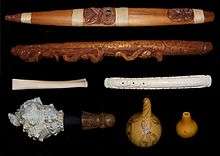Hirini Melbourne
Hirini (Sid) Melbourne ONZM (21 July 1949 – 6 January 2003) was a Māori composer, singer, university lecturer, poet and author. He was from Ngāi Tūhoe and Ngāti Kahungunu Maori tribes.
He is known in New Zealand for his work surrounding the revival of Māori culture.[1] A member of Ngā Tamatoa, which petitioned the New Zealand Government to have Maori taught in schools as part of its focus on Maori identity, he also studied at the University of Auckland and later became the Dean and associate professor of Māori and Pacific development at the University of Waikato.[1][2] Melbourne is a significant figure in the revival of the Maori language with dozens of his now classic songs sung in classrooms throughout New Zealand. The power of his melodies and the brilliance of his compositions have still to be widely recognised beyond the classroom however. In the last two decades of his life Hirini’s musical interests extended to a fascination with traditional Maori instruments. Initially intrigued by instruments found only in museum glass cases, he subsequently met ethnomusicologist and performer Richard Nunns and from 1989 onwards the two regularly performed together on marae, and in schools, galleries and concerts. This partnership lead to the release of ‘Te Ku Te Whe’, a CD of original and traditional compositions for a variety of Maori flutes which has been awarded a Gold Disc Award. A second CD together with a DVD ‘Te Hekenga-a-rangi’ was released in 2003. In 2002 Hirini was awarded an Honorary Doctorate from the University of Waikato where he had been a lecturer in the Department of Maori. He was appointed an Officer of the New Zealand Order of Merit in the 2003 New Year Honours, for services to Māori language, music and culture,[3] just before his death a week later.[4]
In 2009 Melbourne and Nunns were inducted into the New Zealand Music Hall of Fame.[5]
References
- "Follow Amplifier". Amplifier.co.nz. Retrieved 25 May 2018.
- "Obituary: Hirini Melbourne". Nzherald.co.nz. 10 January 2003. Retrieved 25 May 2018.
- "New Year honours list 2003". Department of the Prime Minister and Cabinet. 31 December 2002. Retrieved 26 July 2019.
- "Archived copy". Archived from the original on 4 December 2008. Retrieved 23 July 2009.CS1 maint: archived copy as title (link)
- New Zealand Press Association (18 September 2009). "Lawrence Arabia wins silver scroll". Fairfax New Zealand. Archived from the original on 24 October 2010. Retrieved 24 October 2010.
